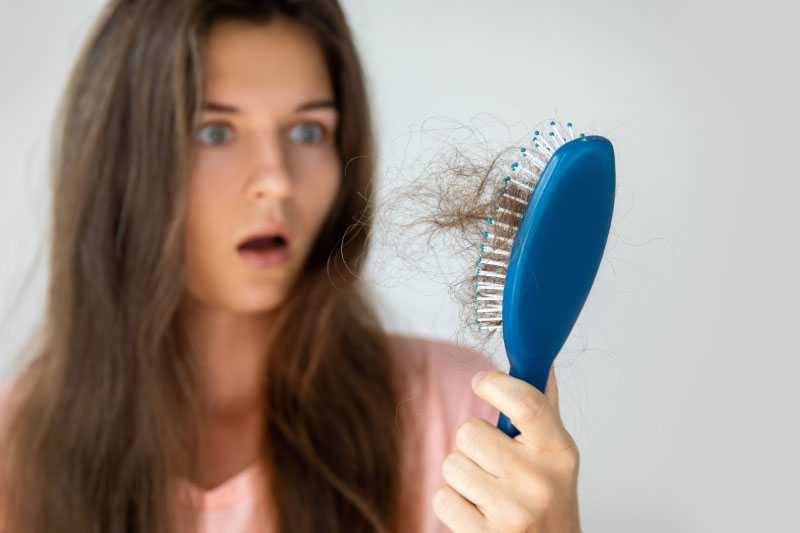Hair Loss: What May Be Causing It and What You Can Do
Little did you know, your hair loss can be a sign of bigger problems going on in your body.

Are you finding more hair than usual around your home or noticing your hair isn’t as full as it once was? Hair shedding or hair loss may be the reason.
Hair shedding
It’s normal to shed hair daily. On average, a person sheds between 50 and 100 hairs a day. Anything more than that is a sign of excessive hair shedding.
Hair shedding can be a result of various life experiences:
- Weight loss
- Pregnancy and birthing
- Increased stress
- Fever
- Previous operations
- Illness recovery
- No longer taking birth control pills
The good news is that hair shedding often stops once your body has readjusted—which can sometimes take a few months. However, it can continue if you, for example, live a high stress life.
Hair loss
Hair loss is different from hair shedding. Hair loss occurs when the hair stops growing from the follicle. Some people experience both hair loss and hair shedding.
While thinning hair can often be attributed to aging, excessive hair loss can be a sign of an underlying health condition, a result of a nutritional imbalance, or medication side effect.
Here are just five potential reasons why you’re experiencing hair loss.
Thyroid problems
Hashimoto’s disease (an autoimmune condition that causes the body to attack the thyroid gland) and hypothyroidism (a condition where the body has lower levels of the thyroid hormone) can cause significant hair loss if left untreated.
Other symptoms of thyroid problems that may accompany hair loss are chronic fatigue, muscle weakness, sensitivity to cold, dry skin, and weight gain. Stay on the lookout for these additional symptoms of thyroid disease. Thankfully a visit to an endocrinologist can help you find the right treatment plan to help you get things back on track, including your hairline.
Alopecia
If your hair is falling out in big clumps without much growing back, you could be showing signs of alopecia, which is an autoimmune disorder that causes extreme hair loss. This disease also doesn’t just affect hair on the head, but all over the body including arms, legs, eyebrows, and eyelashes. Alopecia can’t be cured, but it can be treated. A dermatologist can be a good start in diagnosing and treating alopecia.
Nutritional issues
Is your hair brittle, breaking, and falling out? If yes, your hair loss may be due to a deficiency in nutrients like iron, biotin, protein, zinc, or vitamins B or D. Many different nutrients play different parts in regulating hair growth and keeping those strands strong. Thankfully, a simple blood test and visit with your healthcare provider can help you determine if you need to make some changes in your diet to get adequate vitamin levels.
Medications
Certain medications may be the culprit of your thinning hair. Common medications like antidepressants, immune suppressant drugs, antibiotics, acne medications, and even birth control can cause significant hair loss. Even though you may be feeling self-conscious about your thinning hair, do not stop taking your prescribed medications. Talk to your healthcare provider about other possible options.
A stressful event
Hair falling out is often jokingly attributed to stress, but little do people know that after stressful events like giving birth, getting married or divorced, undergoing a surgical procedure, experiencing a death of a loved one, or making a sudden major life change can cause emotional stress that affects the regular regrowth cycle in your hair follicles.
About three months after the initial stressful event, your hair may start falling out due to the disturbance in body chemistry in the months prior. This phenomenon is called telogen effluvium. Thankfully, it’s temporary, but if you’ve experienced a major stressful event in life, reaching out to a mental health professional can help you get things in order again.
There are other potential reasons of hair loss to keep in mind:
- Hereditary hair loss
- Chosen hair care products and treatments
- Certain hairstyles
- Hormonal imbalances
- Scalp infections
- Hair tugging
- Sexually transmitted infection (STI)
- Friction caused by clothing or other items that rub against the scalp
Related: Nervous Habits That May Be Affecting Your Health
Understanding what the underlying reason is for your hair loss can help you and your healthcare provider take the right steps to preventing further hair loss and what can be done to spark hair re-growth. Your healthcare provider will consider several factors to determine the best course of action:
- Whether your hair falls out quickly or gradually
- Can regrow without intervention
- Requires grow treatments
- Needs immediate care to stop permanent hair loss
Hair loss may seem like a drag, but it can truly help in identifying underlying problems that may have gone unnoticed otherwise. A quick visit to your healthcare provider can help you start finding the answers you seek.
Related: Tips for Keeping Your Skin and Hair Healthy in the Winter





